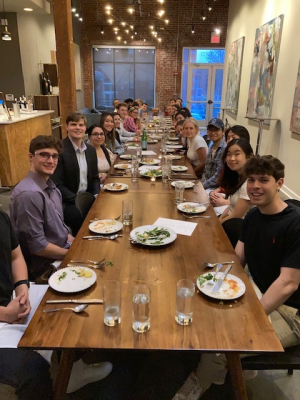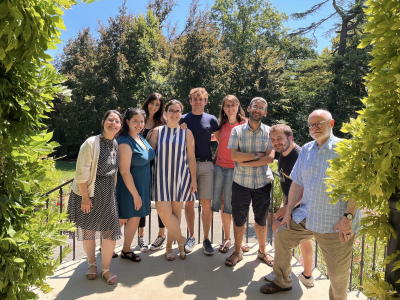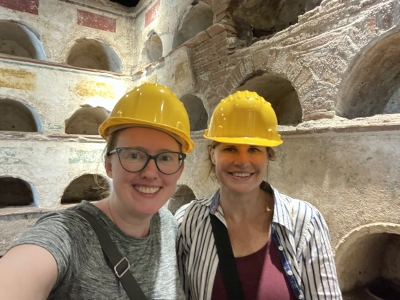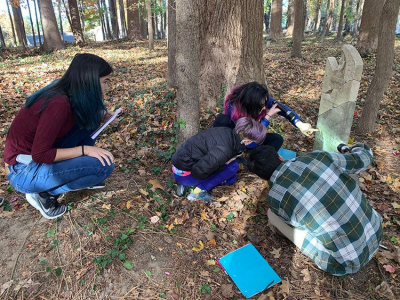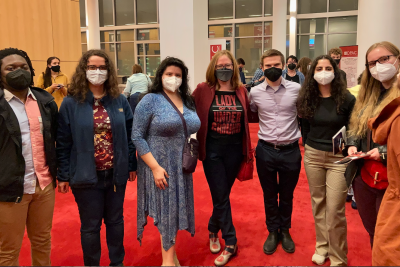Jed Atkins
"This past academic year saw the publication of the Cambridge Companion to Cicero's Philosophy, which I edited with Thomas Bénatouïl. This Companion offers a guide to 'Cicero the philosopher.' It provides an access-point for non-specialist readers interested in Cicero and the many philosophical topics he explored, and it invites those already familiar with Cicero to view his philosophical writings afresh through the lens of recent interdisciplinary scholarship. I contributed a chapter on “Empire, Just Wars, and Cosmopolitanism.” I am also happy to report the publication of 'Hope and Empire in Ciceronian Eschatology,' in Eschatology in Antiquity, edited by Karla Pollman, Helen Van Noorden, and Hillary Marlow, 267–79. Routledge, 2021.
"During breaks between the waves of COVID, I returned to conference travel, speaking at a symposium on Republicanism in Baltimore, the SCS in January, a lecture series on Cicero in March, and a conference on Cicero’s De officiis in Munich in June. I have a number of essays in the pipeline on various topics within Ciceronian and Roman philosophy, which should make their way to press in the next year or so: cosmopolitanism and patriotism, just war theory, property and economics, Roman republicanism, the Roman reception of Athenian democracy, Cicero's De oratore (with Leo Trotz-Liboff), and the political theory of Cicero's De officiis. But my main work right now is on the earliest history of tolerance and its relevance for contemporary debates in liberal political philosophy.
"This past year a couple of projects I direct at Duke enjoyed success. Transformative Ideas, a new sophomore program that invites students to explore life’s biggest questions, successfully completed its first pilot program this spring. Students enjoyed courses such as 'The Good Life: Religion, Philosophy, and Life’s Ultimate Concerns,' 'Medicine and Human Flourishing,' and 'Ambition and Politics.' We welcomed panels of alumni for conversations about how their own religious and philosophical traditions shaped their lives beyond Duke. We also unplugged and made lasting intellectual friendships at a camp in the NC mountains. You can read all about it here. The Civil Discourse Project in the Kenan Institute for Ethics held a very successful faculty summer seminar on 'Teaching Civil Discourse in the College Classrooms.' We hosted 22 faculty from universities and colleges across the country to equip them to teach a course at their own institutions that prepares students to disagree well about politics, moral, and religious questions. You can read about this initiative here."
Tolly Boatwright
"This year, my second in retirement, has passed quickly and happily. Work continues on my biography of Agrippina the Younger, whom I find ever more fascinating. The generosity of Jens Daehner at the Getty Villa in April let me spend some close-up time with my favorite bust of her (see attached). Looking to lesser-known aspects I wrote 'The Missing Familia of Agrippina the Younger' for a forthcoming Gedenkschrift for Anthony Birley. Next spring I plan to visit the tiny island of Pontia (Ponza, off the coast of Gaeta, Italy), where Agrippina languished two long years before Claudius, newly acclaimed princeps, recalled her and others Caligula had exiled. (Little did Claudius know what was in store for him!)
"Other research interests remain lively. I collaborated with Richard Talbert on five plans of ancient Rome and their accompanying texts for a new edition of his Routledge Atlas of Classical History. In late April I contributed a paper, 'Representing Native Women in Roman Art: Distinction or Assimilation?,' to Naming the Natives, a comparative seminar at Rice University assessing views of indigenous peoples expressed in the Roman empire and the growing US empire of the 18th and 19th centuries. The proceedings, edited by the seminar’s organizers Michael Maas and Fay Yarbrough, will be published by the University of Oklahoma Press. In October 2021 I was interviewed on Polish TV about my Imperial Women of Rome: Power, Gender, Context (OUP).
"Freer time allowed me to connect over the year with numerous Duke classicists, including Dave Brafman (PhD, 1985); Anne Maxson (BA, 1995); Ed de Horatius (BA, 1995); and Willy Nifong (BA, 1989). I’d love to see more of you. Perhaps at the Centro’s 60th Gala in Rome in2025, if not before... Keep in touch!"
Cassandra Casias
"My article recently came out in Studies in Late Antiquity, 'Rebel Nuns and the Bishop Historian: The Competing Voices of Radegund and Gregory of Tours.' In July and August, I stayed at the Fondation Hardt in Switzerland under their grant for scholars under 35 years old. While there, I worked on my project about enslaved wet nurses in Roman Africa. Pictured: some of the outstanding scholars I met at the Fondation."
Rex Crews
"I am honored and delighted to continue to oversee our elementary Latin instruction program and to work with enthusiastic graduate instructors and undergraduate students. This past year we have been striving to involve even more students in our elementary Latin program, and I am pleased to say that we have a number of excellent students. Returning to in-person instruction has been a worthwhile challenge, and we are looking forward to the semester ahead. We have a joint Latin pedagogy workshop planned with UNC on August 11th, and we are looking forward to that and to the year ahead!"
Gregson Davis
"The Omicron variants of Covid have continued to cast their shadow over all our undertakings, especially those involving travel abroad. However, the pleasures of retirement have compensated, to some extent, for the restricted mobility, so I have been able to pursue my research and writing without interruption and at a leisurely pace. The volume of essays, Epicurus in Rome, which I co-edited with Sergio Yona, has appeared under the imprimatur of Cambridge University Press. As far as travel is concerned, after delivering the A. E. Housman annual lecture in Greek and Latin at the University College, London, I made use of the opportunity to fulfill a longtime desire to visit part of Hadrian’s Wall. My wife, Daphne, and I enjoyed seeing old friends of hers in Manchester, Bristol, London and Cornwall."
Lauren Ginsberg
"It was great to be back in the classroom full-time with our undergraduates and graduate students last year. I particularly enjoyed inaugurating our new Roman Drama and Performance class (CLST 304/THEATRST 227/VMS 240) with graduate co-instructor, Clinton Kinkade. This course had students investigating both surviving ancient plays by Plautus, Terence, Seneca, and fragments of lost playwrights, but also involved students in questions of performance, genres like mime and pantomime, the statues and evidence for those involved in the theater industry at all levels, and questions of the role of drama in culture. Fun was had by all!
"Outside of the classroom, I was exited to be commissioned to write a historical essay for anew opera, Poppaea, by Michael Hersch and Stephanie Fleischmann in honor of its world primer at the WienModern festival in Vienna. I was able to travel to the premiere and take part in a media panel. This fall I’ll be heading to Baltimore for the inaugural screening of this opera. This work was featured by Duke Research in the World.
"My research has also been keeping me busy. I am working on a new book on Nero’s first wife, Claudia Octavia. The Roman people’s loyalty to this woman was so great that the risked their lives to incite mass protest across the city when they heard Nero planned to divorce her! Yet she rarely gets any attention in prominent histories of his reign. My book tries to uncover what we know about this fascinating woman and what her story can tell us about the lives of the lesser known imperial women of Rome. In order to pursue this research, I returned to being a student - I enrolled in the British School in Rome’s Latin Epigraphy Course which brought me back to the Eternal city and into the storerooms and collections of inscriptions throughout the city. My particular interest was the surviving inscriptions of Octavia’s household including enslaved peoples whose stories I hope to investigate in this larger project. It was great fun to be a student again, even if it was during a heat wave.
"I’m looking forward to another great year with Duke Classical Studies!"
Alicia Jiménez
"I am excited to have started two new projects this year. The first is the 'Durham Black burial grounds collaboratory' with Adam Rosenblatt (International Studies, Duke University), Charles Johnson (Public History Program, North Carolina Central University) and Khadija McNair (Historic plantation of Stagville) in the context of Duke’s Office of the Provost grant 'Reckoning with race, racism and the history of the American south'. The group will study in the next two years the African American burial grounds in Durham, and work to make them spaces that educate the public and honor the dead. Thanks to the grant, students taking Principles of Archaeology (CLST 144) and the Archaeology of Death (CLST 89s) visited Geer Cemetery to learn about the segregation of cemeteries, Durham’s African American community, funerary monuments, and how archaeologists read difficult inscriptions (see picture of undergraduate students deciphering the epitaph of Mary Dunston’s headstone at Geer Cemetery). They also used georeferencing methods to establish the location of monuments and create 3D models using photogrammetry with guest professors Ed Triplett (Art, Art History and Visual Studies) and Andrew Tharler (Thompson Writing Program), as well as Duke’s Archaeology graduate students Antonio LoPiano, Tara Wells, Danielle Vander Horst and Andrew Welser. A descendant and member of the Association 'Friends of Geer Cemetery', Michael Williams, gave the closing remarks and told the students how his ancestors arrived from the Stagville plantation to Durham.
"The second is a new project funded by a Duke-Exeter initiator grant with colleagues from the University of Exeter (Ioana Oltean and Joao Forte). A workshop at Duke in the Fall of2022 will provide the group with the opportunity to build synergies for collaborative research and publications that explore the materialities of the Roman conquest and its implications for indigenous mobility and migration patterns within some of the western provinces of the Roman Empire (Hispania, Dacia and Britannia).
"In the Fall of 2021, I received a Decanal commendation for the undergraduate course evaluations of the Capstone Seminar, Roman Coinage (CLST 480S, Spring 2021). This past academic year I have also given online talks at Columbia and Exeter Universities and participated in archaeological conferences about the Roman Army (Universitat Autònoma deBarcelona) and remote sensing in archaeology (Spanish National Research Council, CCHS-CSIC). Finally, I summited a journal paper on the Roman camps at Renieblas (now under peer review), and I have been invited to serve as a member of the editorial board of Archaeologia Iberica, a new journal on the archaeology of the Iberian peninsula from the Iron Age to the early Medieval Period."
Erika Weiberg
"The last year - my second at Duke - was full of new connections. I became a secondary appointment in the Theater Studies Department, where I will collaborate with colleagues and hopefully recruit some Theater Studies majors to take my Greek drama classes. In the fall, I was invited to give a talk on my research at the Franklin Humanities Institute (FHI) at Duke, which I delivered in the brief window of time when FHI was hosting hybrid rather than strictly virtual talks. It was wonderful to meet colleagues in other departments whose research overlaps with mine. In the fall my article titled 'False Reports and Waiting Wives on theHome Front in Aeschylus’ Agamemnon and Sophocles’ Trachiniae' appeared in the journal Classical Philology. In the spring, I was delighted to get to take the majors in my capstone seminar to a performance of the musical Hadestown at DPAC with the support of a David L.Paletz Innovative Teaching Grant. I've included here a photo of faculty and students who attended in the lobby after the show. For many students, this was their first time attending alive performance of a musical! My colleague, Prof. Lauren Ginsberg also hosted a panel discussion on the musical that I participated in through the FHI. Check out FHI's YouTube channel to catch the recording! It was a well attended event full of excellent insights and questions from the audience about this musical adaptation of the Orpheus and Eurydice myth. In the spring I delivered a paper on Maggie Nelson's The Argonauts at the Feminism andClassics Conference at Winston-Salem. This summer I spent a wonderful two weeks at the Paros Literary House on the island of Paros - mornings were spent writing and afternoons at the beach. What more could a writer ask for? I'm looking forward to another year connecting with colleagues and students at Duke!"
Clare Woods
"After stepping down as Director of the Thompson Writing Program at the end of June, 2021, I enjoyed a first semester of sabbatical in Fall 2021. My primary research goal in that semester was to make progress with a book proposal, provisionally entitled, Books on the Road: Manuscripts and Social Networks in Carolingian Francia. This project brings together the explorations I've been conducting in recent years into the materiality of medieval networks. What can the circulation of texts (as traced through extant contemporary or near-contemporary manuscripts) tell us about the ways scholars and writers built their networks, connected with fellow intellectuals, and engaged with readers and patrons? My sabbatical in Fall 2021 gave me the space to read extensively and explore some of the more recent publications on networks, and on the persons and texts that will figure prominently in the book. In Spring 2022, I returned to teaching among other things (more on these below). Work on the monograph slowed a little, but, as I write this for Pheme, I'm pleased to say I now have a solid draft for my sample chapter, Chapter Three, which will focus on the early career of Hrabanus Maurus. I look forward to completing the proposal and, hopefully, a second chapter during my sabbatical this coming Fall.
"As mentioned above, I returned to teaching for Classical Studies in Spring 2022. I taught a graduate seminar in Medieval Latin in which we read texts from the Carolingian period, as well as - for the first time in a couple of years - my undergraduate History of the Book course.This time around, we weren't able to use the dedicated RBR seminar room for History of theBook, but the Rubenstein Library and librarians did a fantastic job, despite reduced staff and reading room hours, to make rare materials available to the class. As usual, students 'adopted' a rare book and researched its personal history; further, as part of a team, they made a book using ancient, medieval, print, or digital techniques. I always have a blast teaching this class - I think everyone, including me, comes away with new insights into the long and fascinating history of communication technologies.
"Finally, some personal news. I am delighted to announce that I got married in late January to an old friend and fellow Brit, Dave Rowson. Dave has moved to the States to live with me in Durham, where he is enjoying the unBritish weather, the fabulous food and brewery scene, and of course making new friends. With best wishes to all, and stay well!"

